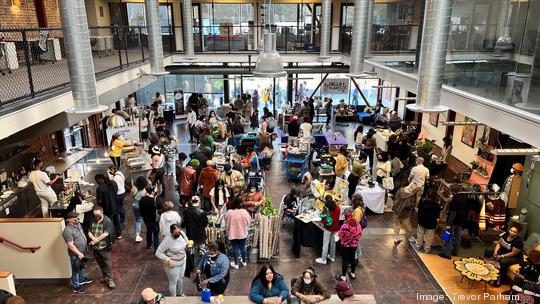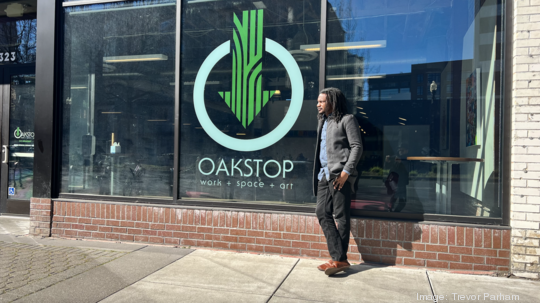
They say hard times reveal character. This can be true not just for people, but for businesses as well.
It certainly proved true for Oakstop, an Oakland-based social enterprise offering space in commercial real estate for working, events and art galleries with a focus on Black businesses and entrepreneurs.
Led by CEO and founder Trevor Parham, Oakstop used the adversity of the last two years as an opportunity to show what it’s really about: supporting the community.
Like virtually all brick-and mortar-businesses, Oakstop was hit hard by the pandemic. We spoke with Parham at the end of 2020, when he told us that along with dropping himself from the payroll, he had to shrink his staff by about 75% (he has since restored a full team and is again earning a salary).
But his focus wasn’t on the company’s limits and what it couldn’t do given the circumstances: It was on what they could.
“Oakstop’s brand is all about supporting the community through our spaces and our networks. So during the pandemic, we doubled down on supporting the community,” Parham said. “It showed people who we truly are in terms of going the extra mile to support and serve the community in ways that went beyond just our space.”
On top of using its spaces to deliver pandemic response services and house local organizations, Oakstop has worked to be a source of inspiration for other businesses that felt that it was time to give up. “People need inspiration in a time like this, people need hope. And if I can focus on not just maintaining but also manifesting, that’s going to benefit everybody.”

Since the start of the pandemic, Oakstop has opened three more locations (including the one I visited at 2323 Broadway) and formed a campus-style configuration made up of its five locations in Downtown Oakland. Parham is also looking forward to opening a seventh location in West Oakland, an acquisition made possible through $707,200 in funding from the Hewlett Foundation, one of the five grants the Foundation awarded to community-based, BIPOC-led performing arts groups (the new location will be a music recording studio.)
Parham also established the Oakland Black Business Fund, a grant-making program he co-founded in June 2020 alongside Elisse Douglass. The fund has raised approximately $550,000 and has completed over 20 funding rounds since the beginning of the pandemic, supporting a total of 175 local businesses. They’ll be hosting a gala event at the end of March to showcase the successes of the businesses who have participated in their programs and to celebrate the work of the Oakland Black Business Fund.
Given how devastating the pandemic has been for businesses, I wanted to know how Parham was able not only to keep Oakstop alive but to expand his business and take on new projects. He explained that in business, cash isn’t the only currency and that he is aware of the multifaceted, systemic relationship between business and community, and how the value of this relationship (and the business’s success) isn’t necessarily determined by money alone.
“I think a lot of what we’ve been able to leverage is both our social currency and our cultural currency as a way to navigate different opportunities,” he said. “All of the new opportunities that we had, people came to us, because they were aware of our brand and respected the work that we do.”
This is perhaps most evidenced by the three new locations Oakstop acquired during the pandemic. After companies vacated their leased office space in commercial real estate en masse, landlords across the city were left to contend with their newly empty spaces. “It was really an opportunity for people to make changes that optimize how their buildings are being occupied,” said Parham.
As for the broader coworking industry, Parham sees a bright future. Flexible office space was already an attractive option both for employees seeking a collaborative and connected work environment and for employers looking to enter into less expensive and more flexible leases. The circumstances introduced by the pandemic — a remote workforce and widespread cost-cutting — have only increased the appeal. However many coworking companies are still cutting back and even the industry’s most successful players like WeWork have had to curtail some of their ambitions.
“I think that coworking is going through a critical shift right now,” Parham said. “I think this is really an answer for a lot of people at this time, and I’m seeing a lot of people who have their eyes on coworking and are simply waiting for the right time to commit and engage, whereas previously there were people who never even had any conception of it.”
Check out this week's list on largest coworking spaces in the bay area.



